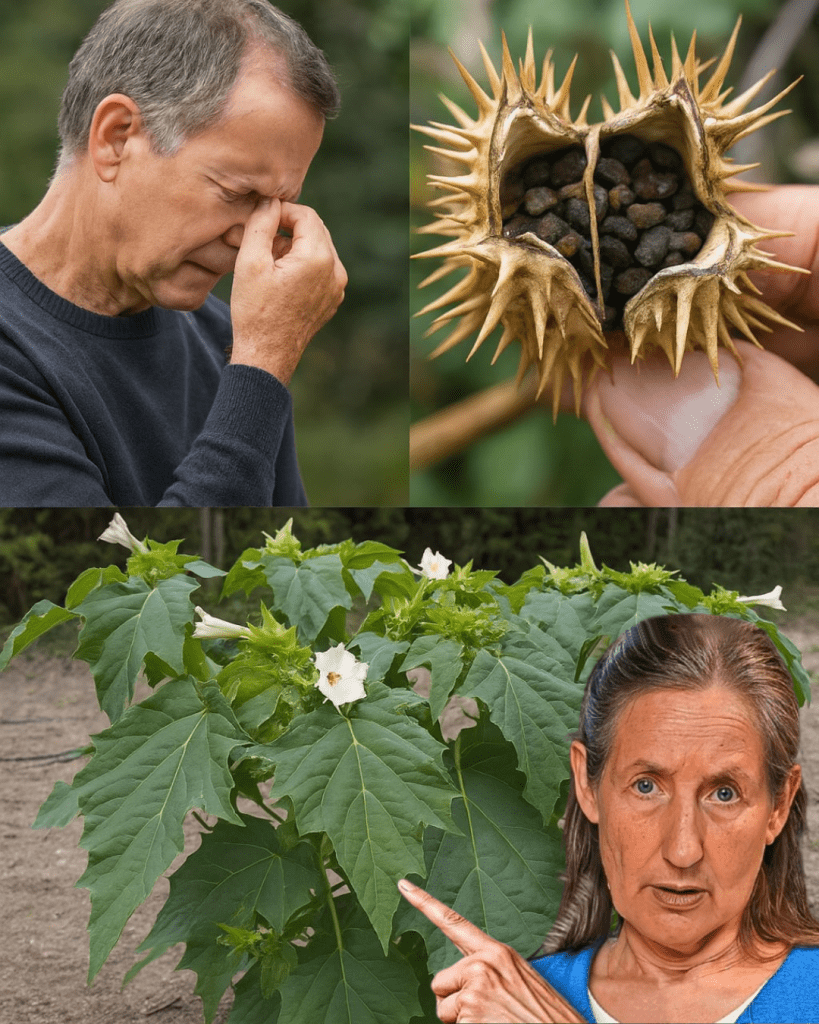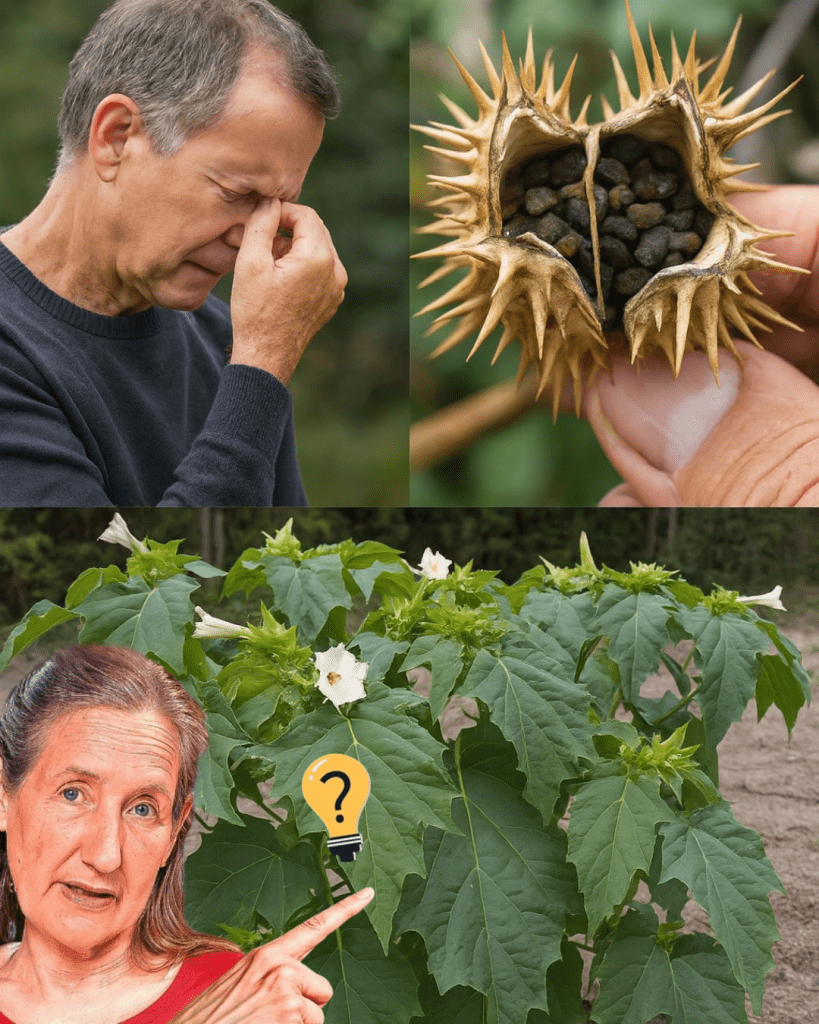Step into the shadowy allure of Datura stramonium, a plant that whispers tales of mystery, danger, and ancient wisdom. Known as jimsonweed, devil’s trumpet, or thorn apple, this enigmatic member of the nightshade family captivates with its haunting beauty and potent powers. But beneath its striking trumpet-shaped flowers lies a double-edged sword—Datura is as perilous as it is fascinating. From its historical use in sacred rituals to its modern-day risks, this plant demands respect and caution. Ready to unravel the secrets of this botanical enigma? Let’s dive into its captivating world, exploring its benefits, uses, and the dangers that make it a plant like no other.

🌿 A Plant of Contrasts: Beauty and Danger Intertwined
Datura stramonium is no ordinary weed. Thriving in disturbed soils across the globe, from roadsides to abandoned fields, its bold presence is hard to ignore. With its intoxicating fragrance and dramatic appearance, it’s a plant that seems to beckon the curious. Yet, its potent alkaloids—atropine, scopolamine, and hyoscyamine—make it a force to be reckoned with. These compounds, which act on the nervous system, have been harnessed for centuries in traditional medicine and rituals, but they also carry the risk of severe toxicity. Whether you’re a gardener, a herbalist, or simply intrigued by nature’s mysteries, understanding Datura’s dual nature is essential.
🌸 Botanical Brilliance: What Makes Datura Stramonium Unique
A member of the Solanaceae family, alongside tomatoes, potatoes, and deadly nightshade, Datura stramonium is a botanical marvel native to the Americas but now found worldwide. Its distinctive features make it easy to spot, but its beauty belies its danger.
Key Characteristics:
- Height: Grows up to 1.5-2 meters, standing tall in any landscape.
- Leaves: Broad, dark green, with jagged, irregular lobes.
- Flowers: Large, trumpet-shaped blooms in white or pale purple, emitting a sweet, heavy fragrance at night.
- Seed Pods: Spiny, oval capsules that burst open to release small, black seeds, packed with potent alkaloids.
These features make Datura a striking addition to any garden, but its toxic nature means it’s best admired from a distance.
💊 Traditional Uses: A Legacy of Healing and Ritual
For centuries, Datura stramonium has held a revered place in traditional medicine and spiritual practices across cultures. Its psychoactive and medicinal properties have been harnessed with great caution, often by those with deep knowledge of its risks.
Historical and Cultural Uses:
- Ayurveda and Hinduism: In India, Datura is sacred to Lord Shiva and used in rituals like Ganesh Chaturthi. Its seeds and leaves have been employed to treat asthma, pain, and intestinal worms, but only after rigorous purification processes.
- Traditional Medicine: Across South America, Europe, and Asia, Datura has been used to relieve asthma, bronchitis, and pain. Its leaves were smoked in cigarettes or pipes to ease respiratory issues, while poultices treated burns, ulcers, and swellings.
- Shamanic Rituals: In various cultures, Datura’s hallucinogenic properties were used to induce visionary states, often under the guidance of experienced shamans to avoid dangerous outcomes.
- Witches’ Brews: In medieval Europe, Datura was a key ingredient in “flying ointments,” believed to produce sensations of flight and hallucinations when applied to the skin.
These uses highlight Datura’s power, but they also underscore the need for expert handling due to its narrow therapeutic window.
🩺 Health Benefits: A Double-Edged Sword
When used correctly under strict medical supervision, Datura stramonium offers remarkable medicinal benefits, primarily due to its tropane alkaloids. However, its therapeutic potential is tightly bound to its risks.
Key Health Benefits:
- Respiratory Relief: Datura’s antispasmodic and bronchodilator properties make it effective for asthma, bronchitis, and whooping cough. Smoked leaves or alkaloid-derived medications like atropine have been used to ease breathing.
- Pain Management: The analgesic properties of Datura help relieve pain from conditions like rheumatism, sciatica, and toothaches. Topical applications, such as poultices, soothe joint pain and inflammation.
- Sedative Effects: Its hypnotic and sedative qualities can calm the nervous system, aiding in conditions like insomnia or anxiety, though only in minute, controlled doses.
- Antiparasitic Action: In Ayurveda, Datura leaf extracts mixed with milk have been used to expel intestinal worms, showcasing its anthelmintic properties.
- Antimicrobial Potential: Studies suggest Datura extracts may combat certain bacteria, like Staphylococcus aureus, offering potential in treating infections.
These benefits, while impressive, come with a critical caveat: Datura must be used only by trained professionals, as improper dosing can lead to severe consequences.
⚠️ Health Risks: The Dark Side of Datura
Datura stramonium is one of nature’s most dangerous plants, with all parts—seeds, leaves, flowers, and roots—containing toxic alkaloids. The risk of poisoning is high, especially with recreational or uninformed use.
Symptoms of Datura Poisoning:
- Mild Symptoms: Dry mouth, blurred vision, dilated pupils, and rapid heartbeat.
- Severe Symptoms: Hallucinations, delirium, confusion, seizures, coma, and, in extreme cases, death.
- Anticholinergic Syndrome: Often described by the mnemonic “blind as a bat, mad as a hatter, red as a beet, hot as a hare, dry as a bone,” this syndrome reflects Datura’s impact on the nervous system, causing disorientation and physical distress.
Notable Risks:
- High Toxicity: The seeds are the most toxic, containing up to 0.1 mg of atropine per seed. Consuming just 50-100 seeds can be fatal.
- Unpredictable Potency: Toxicity varies between plants, seasons, and even individual leaves, making safe dosing nearly impossible without expert knowledge.
- Accidental Poisoning: Incidents, like the 2022 spinach contamination in Australia, highlight the danger of Datura being mistaken for edible plants.
- Vulnerable Populations: Children, pets, and those with conditions like glaucoma, heart issues, or gastrointestinal disorders are at higher risk of severe reactions.
Due to these risks, Datura should never be used casually or without medical guidance. Immediate medical attention is crucial if poisoning is suspected.
🌱 Practical Uses: Harnessing Datura Safely
While Datura stramonium is too risky for casual use, its applications in controlled settings are noteworthy. Here’s how it has been used historically and in modern contexts:
- Smoking for Asthma: Dried leaves were traditionally smoked to relieve asthma symptoms, a practice that inspired early medicinal cigarettes.
- Topical Applications: Poultices or ointments made from leaves or bark treat burns, ulcers, and joint pain.
- Tinctures and Extracts: Purified Datura extracts are used in modern pharmacology for conditions like motion sickness (scopolamine) or pupil dilation (atropine).
- Pest Repellent: The plant’s natural insect-repellent properties protect nearby crops, making it a valuable companion in organic gardening.
Always consult a healthcare professional or herbalist before attempting to use Datura in any form.

🧑🌾 Gardening with Caution: Datura in Your Landscape
Datura stramonium’s striking flowers and spiny pods make it tempting for ornamental gardening, but its toxicity demands extreme caution.
Gardening Tips:
- Identification: Learn to recognize Datura’s trumpet-shaped flowers and spiny seed pods to avoid accidental exposure.
- Safe Handling: Wear gloves and long sleeves when handling or removing Datura to prevent skin absorption of alkaloids.
- Pet and Child Safety: Avoid planting Datura in areas accessible to children or pets, as even small amounts can be deadly.
- Removal: If Datura appears in your garden, remove it carefully, ensuring roots are fully extracted to prevent regrowth. Dispose of it securely to avoid accidental ingestion.
For safer ornamental alternatives, consider non-toxic plants like trumpet vine or morning glory, which offer similar aesthetic appeal without the risks.
🌍 A Plant of Power and Peril
Datura stramonium is a botanical paradox—a plant of breathtaking beauty and profound danger. Its rich history in traditional medicine, from Ayurveda to shamanic rituals, showcases its potential to heal when used with expertise. Yet, its toxic alkaloids demand respect, as misuse can lead to devastating consequences. Whether you encounter it in the wild, study its pharmacological potential, or admire its eerie elegance, Datura serves as a potent reminder of nature’s complexity.
Before considering Datura for any purpose, consult a healthcare professional or trained herbalist. Its allure may draw you in, but its risks require vigilance. Embrace the mystery of the thorn apple, but always tread carefully—its power is as real as its peril.









